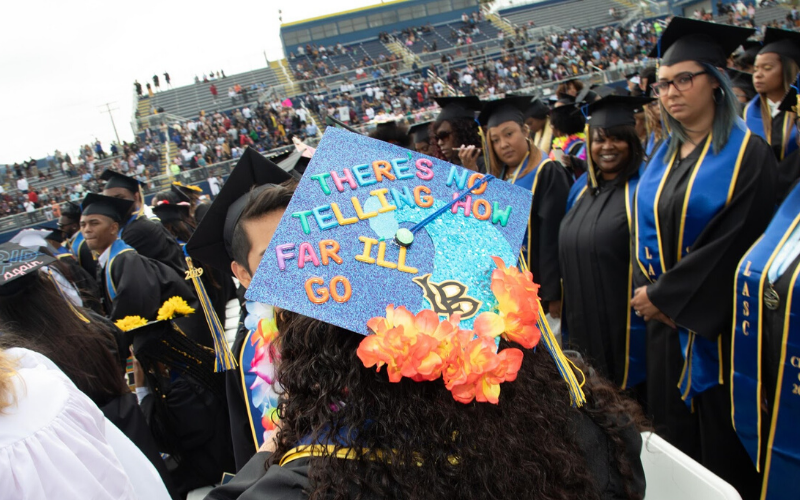Action for Equity

LASC Is An Equity-Based Institution!
Student equity addresses the root of underachievement as it pertains to historical and systemic institutional barriers that negatively impede underserved student success. Inequitable institutional practices include stereotyping, prejudice, discrimination and racism. An equity-centered institution such as Los Angeles Southwest College fosters an inclusive campus environment that promotes multiple strategies for underserved students to increase and equalize student success among all LASC students.
Multiple strategies for equitable outcomes include (a) fair treatment (b) ongoing campus-wide reform (c) data-driven resource allocations (d) cross-campus collaborations (e) and culturally relevant practices.
Fair Treatment: Equity requires that all students are treated fairly, just, and respectfully despite personal and social circumstances such as race, ability, first language, religion, gender, socio-economic status, or sexual orientation.
Campus-Wide Reform: Equity is a campus-wide initiative. All key stakeholders (policymakers, administrators, instructional faculty, faculty, classified, student support services and students) are invested in the success of disproportionate students. Institutional agents adopt a critical lens to identify and address inequitable practices through ongoing student data analysis, challenging dialogue, accountability and appropriate action for institutional change.
Data-Driven Resource Allocation: Equity-centered institutions require ongoing data collection, monitoring, and analysis of the five student success indicators with the identified underserved student populations. Disaggregation of data supports appropriate resource allocations and creation of tailor-fit initiatives that cultivate an accommodating and inclusive learning environment for disproportionate students.
Cross-Campus Collaborations: Institutional agents understand the significance of collaborations between academic affairs and student support services. Equity initiatives combined both academic and student support to ensure disproportionate students receive a holistic educational experience.
Culturally-Relevant Practices: Institutional agents embrace student diversity as it pertains to identity, background, ability and student learning. Institutional agents are open and adaptive to various forms of engagement, pedagogy, and support for disproportionate students.
According to the California Community College Chancellor’s Website (2015) “disproportionate impact” is a condition where some students’ access to key resources and supports and ultimately their academic success may be hampered by inequitable practices, policies, and approaches to student support.
This definition indicates that LASC’s institutional culture and practices play a significant role in supporting and retaining disproportionate students based on institutional culture, values, practices, and policies.
Based upon the disproportionate formula, below are LASC’s disproportionate students:
- Foster Youth
- Latino
- Veterans
- Males
- African Americans
- Disabled students
Access (Outreach): The percentage of each population group that is enrolled compared to that group’s representation in the adult population within the community served.
Course Completion (Retention): The ratio of the number of credit courses that students ― by population group ― actually completed by the end of the term compared to the number of courses in which students in that group are enrolled on the census day of the term. “Course Completion” means the successful completion of a credit course for which a student receives a recorded grade of A, B, C, or Credit.
Basic Skill and ESL Development: The ratio of the number of students ― by population group ― who complete a degree-applicable course after having completed the final ESL or basic skills course to the number of those students who completed such a final course.
Degree and Certificate Completion: The ratio of the number of students ― by population group ― who receive a degree or certificate to the number of students in that group with the same informed matriculation goal.
Transfer Readiness: The ratio of the number of students ― by population group ― who complete a minimum of 12 units and have attempted a transfer-level course in mathematics or English, to the number of students in that group who actually transfer after one or more (up to six) years.
Goal A. Access: Increase enrollment by 2% through outreach and recruitment, targeted marketing, cross-campus communication, and first-year transition activities by 2018.
Goal B. Course Completion: Increase course completion by 2% through supplemental instruction and tutoring expansion, academic intervention and supplies, and mentorship by 2017.
Goal C. ESL/Basic Skills: Increase ESL and Basic Skills completion by 2% through supplemental instruction and tutoring, professional development and first-year academic intervention by 2018.
Goal D. Degree and Certificate Completion: Increase degree and certificate completion by 3% through educational marketing materials, campus-wide degree completion initiatives, and counseling expansion by 2020.
Goal E. Transfer: Increase transfer rates by 3% through transfer research analysis, professional and student development, campus-wide transfer preparation initiatives, and transfer counseling expansion by 2020.
LASC's Equity Plan for 2014-2020 can be viewed here.
Office of Student Services
Office Hours and Location
Mondays to Fridays: 8:30AM - 4:30PM
Saturdays to Sundays: Closed
Student Services Building, Room 209
Contact
Tangelia Alfred, Vice President, Student Services
Email: alfredtm@lasc.edu
Phone: (323) 241-5298
Fax: (323) 241-5424